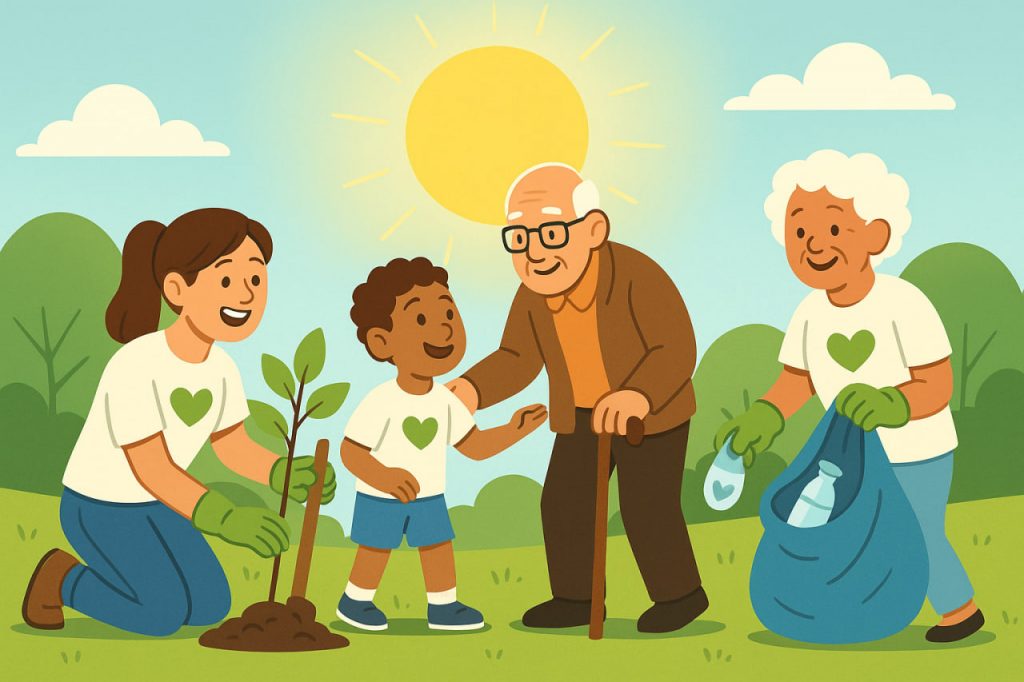Volunteering is one of the most powerful social forces that strengthens not only communities but also the health of the people within them. It creates connections, builds trust, and enhances collective well-being. Scientific research increasingly confirms that volunteer activities have measurable positive effects on both individual and societal health — reducing loneliness, promoting emotional balance, and even lowering the risk of certain diseases.
The Psychological Power of Helping Others
When people volunteer, their brains release endorphins and oxytocin — chemicals responsible for feelings of happiness, empathy, and connection. This natural response, often called the “helper’s high,” leads to improved mood and reduced symptoms of anxiety and depression. Volunteering gives people a sense of purpose, especially during times of stress or uncertainty. Feeling useful and needed strengthens self-esteem and creates a stable emotional foundation.
Moreover, group volunteering enhances social belonging. Humans are wired for cooperation, and working together toward a shared goal — such as cleaning a park or supporting the elderly — triggers psychological satisfaction that solitary activities rarely provide. In this way, volunteering acts as a form of collective therapy, where kindness becomes a tool for healing both the individual and the community.
Physical Health and Longevity
Volunteering also contributes to physical health. Active forms of service — such as tree planting, disaster relief, or food distribution — involve movement that improves cardiovascular function and overall fitness. Studies show that regular volunteers tend to have lower blood pressure, stronger immunity, and even longer life expectancy. Helping others reduces stress hormones like cortisol, improving heart health and sleep quality.
In older adults, volunteering has been linked to a slower decline in cognitive abilities and a lower risk of chronic illnesses. The act of giving time and effort keeps the body active and the mind engaged, counteracting the physical and emotional effects of aging.
Strengthening the Health of Society
Volunteering doesn’t just benefit individuals — it improves the collective health of entire communities. A society with active volunteers is one where people feel safer, more connected, and more supported. Volunteers fill critical gaps in healthcare, education, and disaster response. They also contribute to cleaner environments, stronger social networks, and greater civic trust — all of which are linked to better public health outcomes.
For example, community-led initiatives to support mental health or provide food to those in need reduce social inequality and lower stress levels across populations. When empathy becomes a shared value, rates of violence, depression, and addiction tend to decrease.
Volunteering as Preventive Health Care
Experts increasingly describe volunteering as a form of preventive health care. By engaging in meaningful activities, people experience emotional fulfillment and motivation, which help prevent burnout and isolation. For younger generations, volunteering builds resilience, empathy, and leadership — traits that protect against stress and mental exhaustion later in life.
A Culture of Well-Being
In a world where loneliness and anxiety are on the rise, volunteering offers an antidote — a simple, natural way to reconnect with others and restore emotional balance. It reminds us that health is not just about the absence of illness but also about belonging, kindness, and purpose. A society that values volunteering is, in essence, a healthier, happier, and more humane society.
Interesting Facts
- People who volunteer regularly have a 20–30% lower risk of depression than non-volunteers.
- In some countries, doctors now recommend “social prescriptions” — encouraging patients to volunteer as part of mental health treatment.
- Communities with strong volunteer networks recover twice as fast from natural disasters and crises.
- Volunteering just two hours a week can already bring measurable psychological benefits.
Glossary
- Endorphins — chemicals in the brain that produce feelings of happiness and reduce pain.
- Cortisol — a hormone released during stress that affects the body’s immune and cardiovascular systems.
- Empathy — the ability to understand and share another person’s emotions.
- Preventive health care — actions taken to prevent illness and promote long-term well-being.
- Community well-being — the collective physical, mental, and social health of a population.


